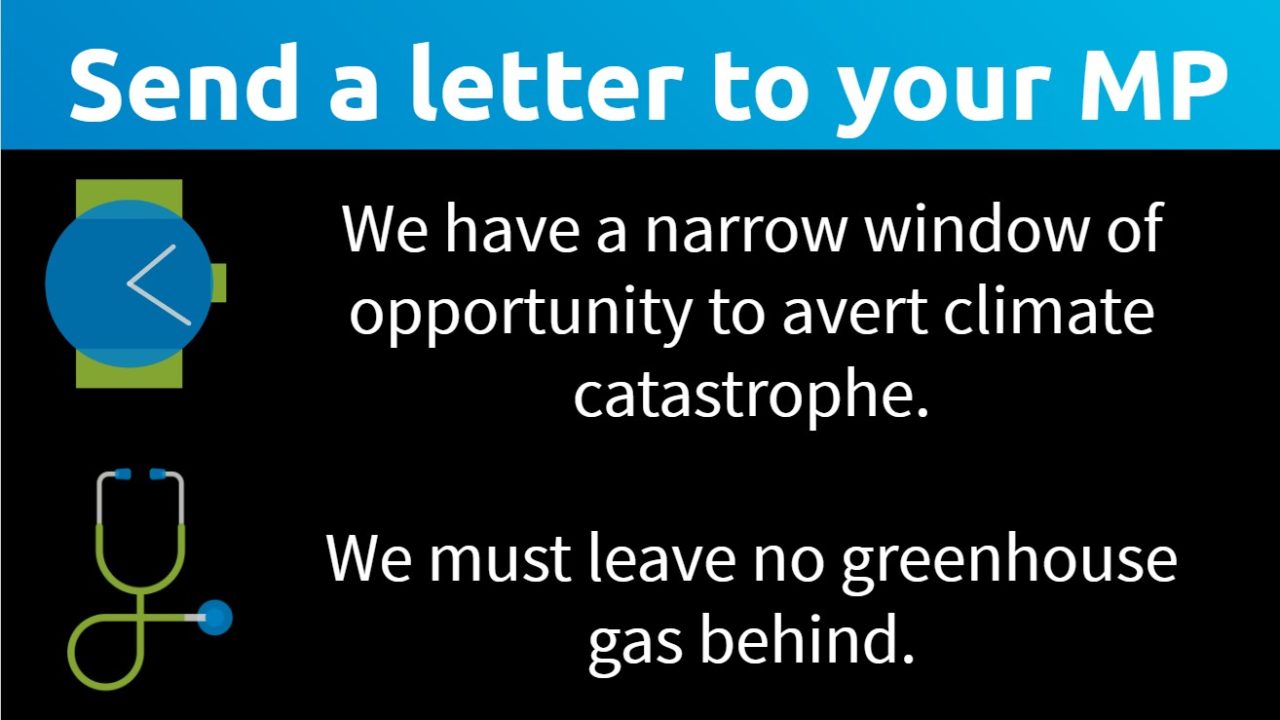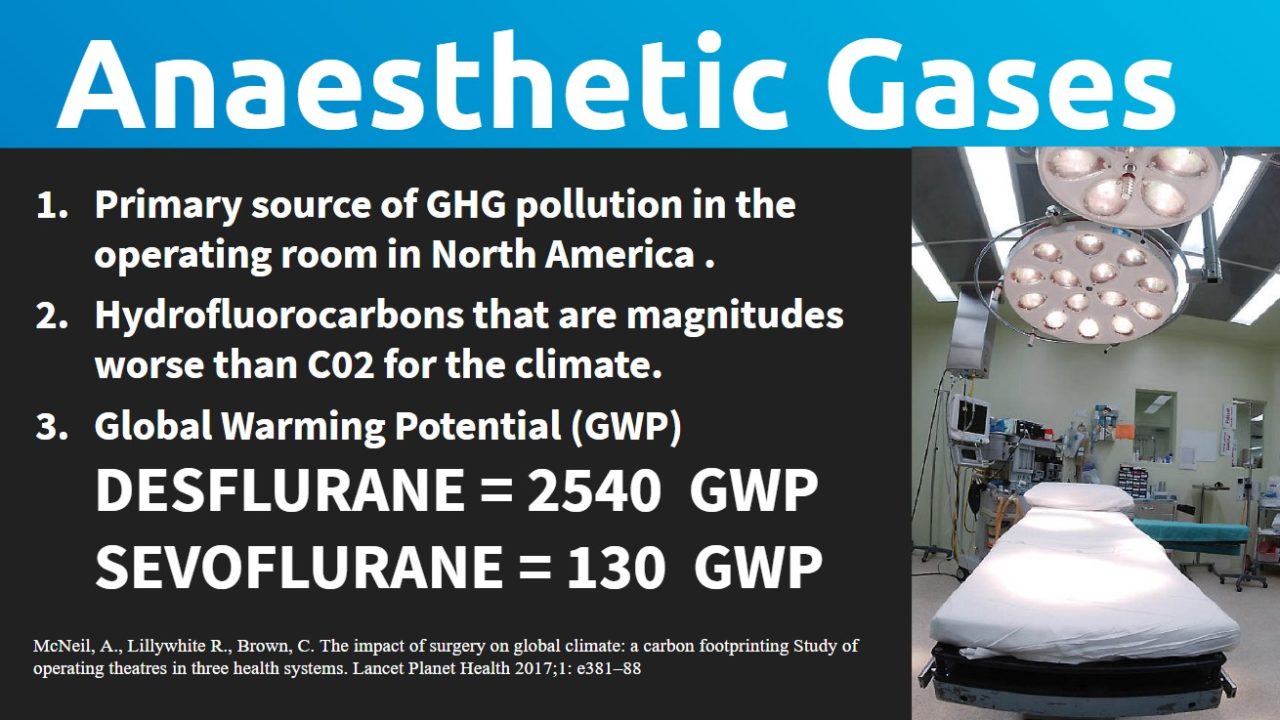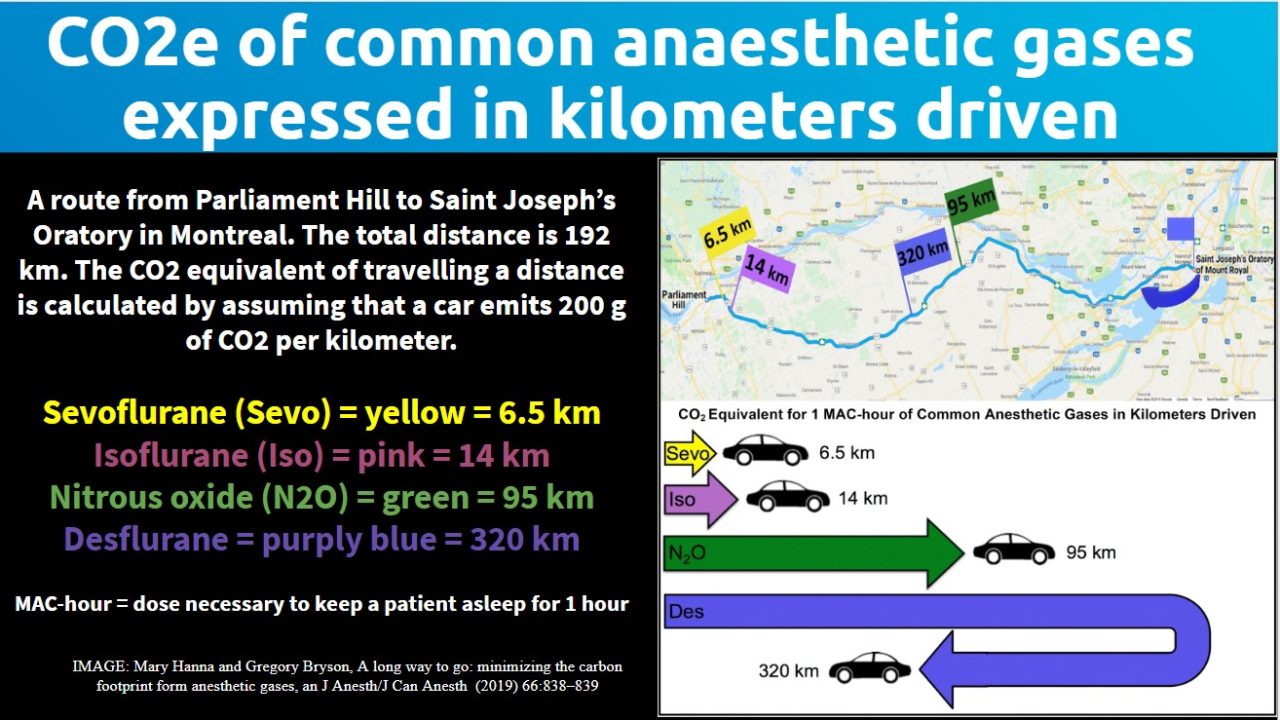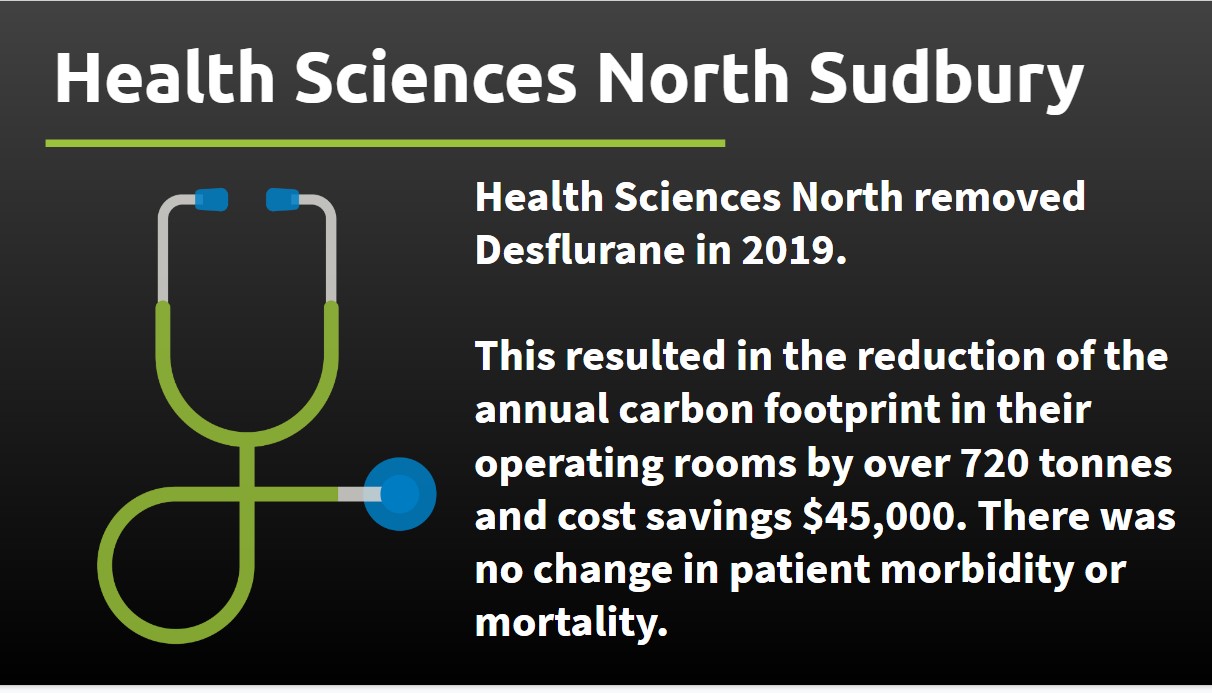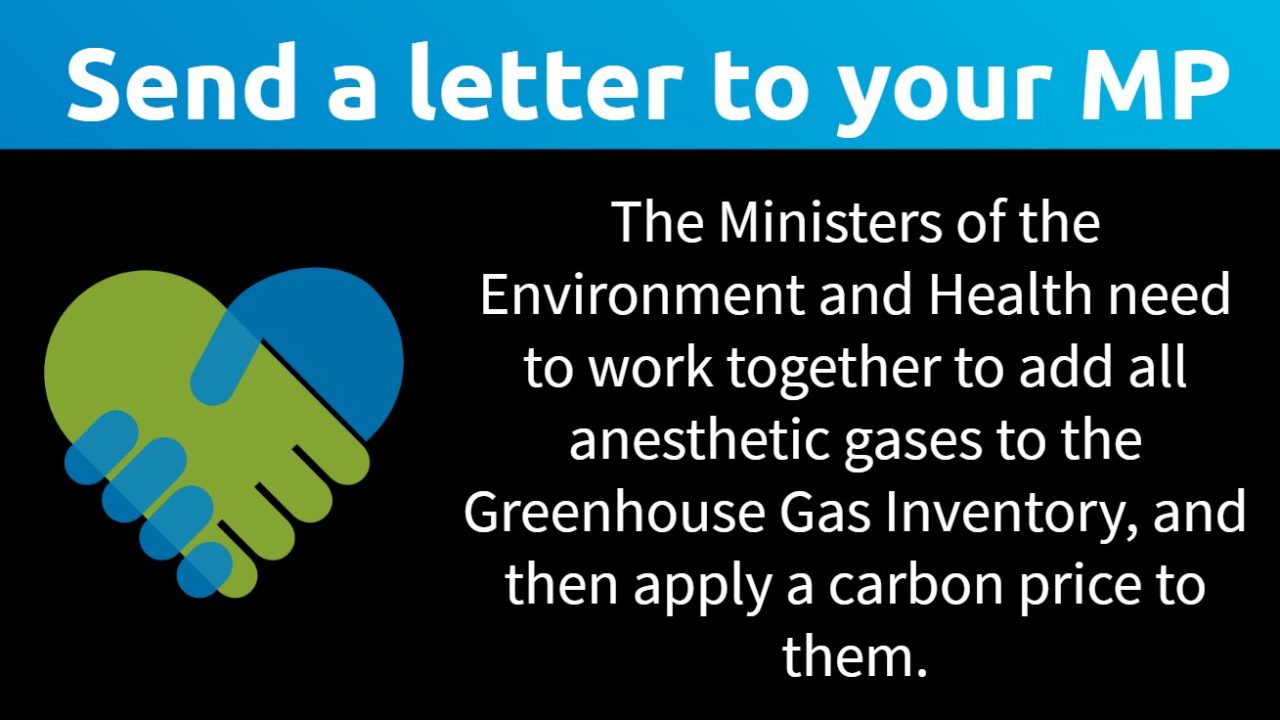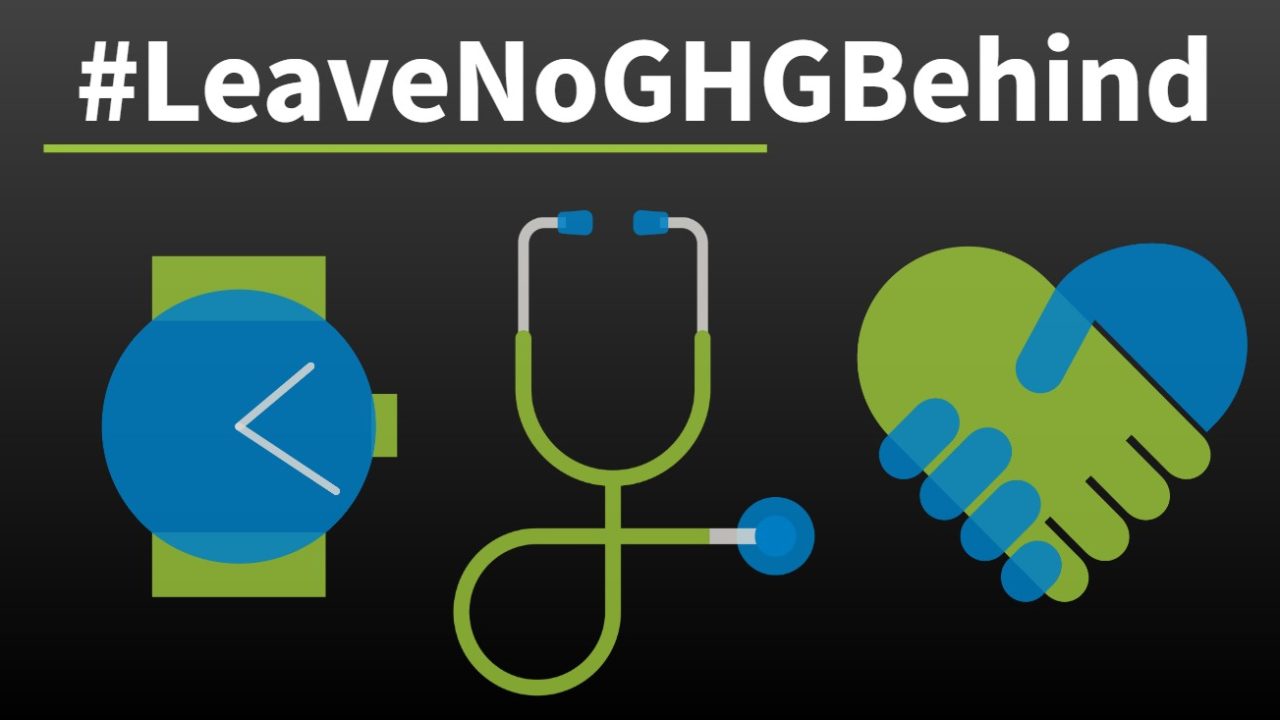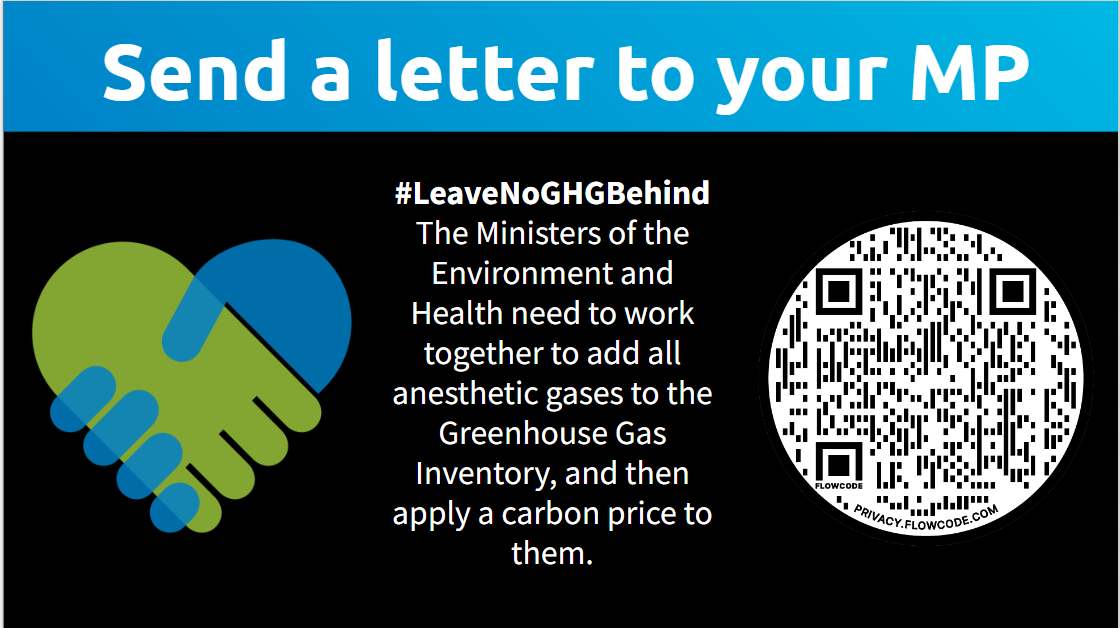Most surgeries use either Desflurane or Sevoflurane to provide anaesthesia. These volatile anaesthetic gases escape into the atmosphere after surgery. They are well-documented greenhouse gases. Notably, Desflurane has a much greater carbon footprint. Desflurane is 26.8 times more potent than Sevoflurane as a greenhouse gas! There is no clinical difference in mortality or morbidity outcomes of patients between the two types of anaesthetics. As a way of comparison, using Desflurane for a seven-hour operation in one operating room is about the same as driving over 2000 km in an average small car in Canada, while using Sevoflurane is about the same as driving 45 km. Health Sciences North in Sudbury, Ontario, removed Desflurane from the hospital’s formulary. After they made the change, the greenhouse gas emissions went down by 723 tonnes in 2020 compared to 2016. Of note, 723 tonnes is equivalent to driving a small car to the moon and back 4 times! With such a dramatic difference in carbon footprints, this is an ideal situation for pollution pricing. At the April 2022 price of $50 per tonne, the carbon price on a bottle of Desflurane would be $44.70, while the carbon price for Sevoflurane would be $2.47. Pricing pollution from volatile anaesthetics will force hospitals to eliminate the use of Desflurane. This will save hospitals money (Desflurane is more expensive), not compromise patient care, and significantly reduce the carbon footprint of operating rooms across Canada. The recent IPCC data is very clear that there is only a narrow window of opportunity to avert climate catastrophe. We must leave no greenhouse gas behind. More resources In May 2022 we launched this open letter and our members sent 354 letters to their Members of Parliament. In 2022, they also lobbied parliamentarians and high-level bureaucrats federally and provincially over 70 times between January 2022 and September 2022. Thank you to all our dedicated volunteers. UPDATE Scotland has become the first country in the world to ban the anaesthetic desflurane. In January, the Canadian Anaesthesia Society (CAS) Guidelines of Practice (2023) now recommends not using Desflurane and Nitrous Oxide. We support Canada banning Desflurane too. In May 2022 we launched an open letter and sent 354 letters to our Members of Parliament. In 2022, we also lobbied parliamentarians and high-level bureaucrats federally and provincially over 70 times between January and September. Thank you to all our dedicated volunteers. Here was our ask regarding the problem of Desflurane: Most surgeries use either Desflurane or Sevoflurane to provide anaesthesia. They are well-documented greenhouse gases. Desflurane is 26.8 times more potent than Sevoflurane as a greenhouse gas! There is a solution. We kindly ask that anaesthetic gases be added to the Greenhouse Gas Inventory, and then apply the carbon price to them. Why use carbon pricing you may ask? The three key reasons were: What happened? Why did it become a hot potato? To circumvent this problem an alternative route was proposed: to have these gases added to the Canadian Environmental Protection Act Registry. To help us, an MP had research done for us at the Parliamentary Library, and it appears, that this is probably the best route to take. But there was one more barrier to overcome: adding volatile anaesthetics to the Greenhouse Gas (GHG) Inventory in the first place. The United Framework Convention on Climate Change (UNFCCC) determines what goes in the GHG Inventory and to date, they have not included volatile anaesthetics in it. Not having volatile anaesthetics in the GHG inventory furthers the problem. Canada does not have precise data on how much anaesthetics are contributing to global warming. Our rough estimates are somewhere between 0.1-2 Mt of CO2 equivalents of GHG pollution from Desflurane, but these are crude estimates. What else have we learned? In 2023, Scotland has beaome the first country in the world to ban the anaesthetic desflurane. In January, the Canadian Anaesthesia Society (CAS) Guidelines of Practice (2023) now recommends not using Desflurane and Nitrous Oxide. We support Canada banning Desflurane too. What are we going to do next? However, we have asked our volunteers who previously lobbied their MP or MPP/MLA/MHA to dump Desflurane to send them a short note about what Scotland and the CAS have done and ask them to consider dumping Desflurane, too. We are in a climate emergency. Every GHG matters. Unfortunately, there is resistance and a lack of cooperation within Parliament and between the federal government and the provincial governments on this issue. It points to the fact why our work is so important. We build bridges and clear the way forward. We are grateful to our dedicated volunteers and cooperative politicians. Stay-tuned. We never give up.Continue reading
Thus, we kindly ask that the Ministry of the Environment and Climate Change and the Ministry of Health work together to add all volatile anaesthetic gases to the Greenhouse Gas Inventory, and then apply the carbon price to them. This will drastically reduce the use of the extremely potent greenhouse gas Desflurane.References
This letter is now officially closed.
Desflurane: A story of low-hanging Fruits and hot potatoes
Desflurane: A story of low-hanging Fruits and hot potatoes
After many discussions on our regularly scheduled calls this year with our volunteers about their lobbying experiences, it became apparent that there were many obstacles to getting volatile anaesthetics added to the Greenhouse Gas Inventory and then applying a price to them. Our low-hanging fruit became somewhat of a hot potato.
Adding volatile anaesthetic to the Greenhouse Gas Pollution Pricing Act would require reopening the legislation and debating it in the House of Commons. Despite being supported by 28 Nobel Prize Laureates for Economics and thousands of top economists worldwide, there is still significant pushback for carbon pricing in Canada. Also, it would be an arduous route for a problem that is complicated because it is shared by several ministries federally and provincially.
The European Union (EU) and the National Health Service (NHS) in the United Kingdom (UK) have legislations that require reducing GHGs at a rate that makes it all but impossible to use Desflurane except in rare circumstances by 2026. The EU regulates fluorinated-GHGs and the UK regulates GHGs in hospitals under their Climate Accountability Act.
For the time being, we have determined that we are no longer going to continue to lobby en masse to get Desflurane out of the Canadian Healthcare system.
Leave No GHG Behind – Send an online letter to Parliament Hill
Home » Leave No GHG Behind – Send an online letter to Parliament Hill


